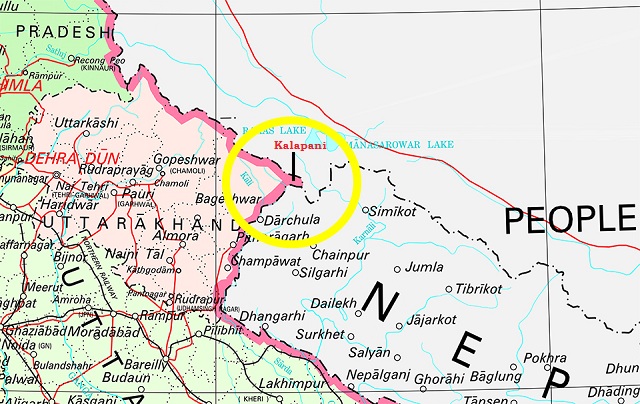

By Sunil Garodia
First publised on 2020-05-25 13:31:07
The last couple of weeks have seen a renewed war of words and maps between India and Nepal. The problem of Nepal's claim over Kalapani is quite old but in recent times, it first arose when Jammu & Kashmir was bifurcated on August 5, 2019 and subsequently India published a new map in November. This new map showed Kalapani, along with Lipulekh and Limpiyadhura as part of the Pithoragarh district in Uttarakhand state.
This immediately drew strong protests from Nepal. It drew India's attention to an understanding reached between the prime ministers of both the countries to settle the dispute through negotiations. It decried the unilateral action by India of including Kalapani in its new map. Nepal witnessed street protests over the issue with the people agitated that India was trampling upon Nepal's sovereignty.
The protests intensified when India inaugurated a road up to Lipulekh Pass on the border with China, leading to an eyeball confrontation with Chinese troops in Ladakh. The Indian Army Chief, General M M Naravane, did not help matters by alluding that Nepal was acting at the behest of China. Although the Nepalese Prime Minister Khagda Prasad Oli is perceived to be pro-China, the Indian blockade of landlocked Nepal after the publication of its new Constitution in 2015 was a major reason Nepal tilted towards China.
With relations deteriorating fast, Nepal has now published a
map of its own which shows all territories that it claims as its own. When
India protested by calling it an "unjustified cartographic assertion", PM Oli
said that the "Indian virus looks more lethal
than Chinese and Italian now". Although he was referring to Indians allegedly entering
Nepal through illegal channels and allegedly carrying the coronavirus to spread
the same in Nepal, the allusion to the territorial dispute was not hard to
miss.
The recent conflagration could have been avoided if
India had acted responsibly. There was no need to include the disputed
territories in the new map in November 2019 if it was agreed that the dispute
would be solved through negotiations. On its part, Nepal, instead of publishing
a map of its own, could have asked for holding the talks between the foreign secretaries of both the countries immediately and not wait for the pandemic to pass, as it was originally
decided upon. Adopting confrontationist postures is easy but solving a problem
through negotiations is what is needed from the two neighbours who have a close
cultural affinity and good relations that go deep back in history.











